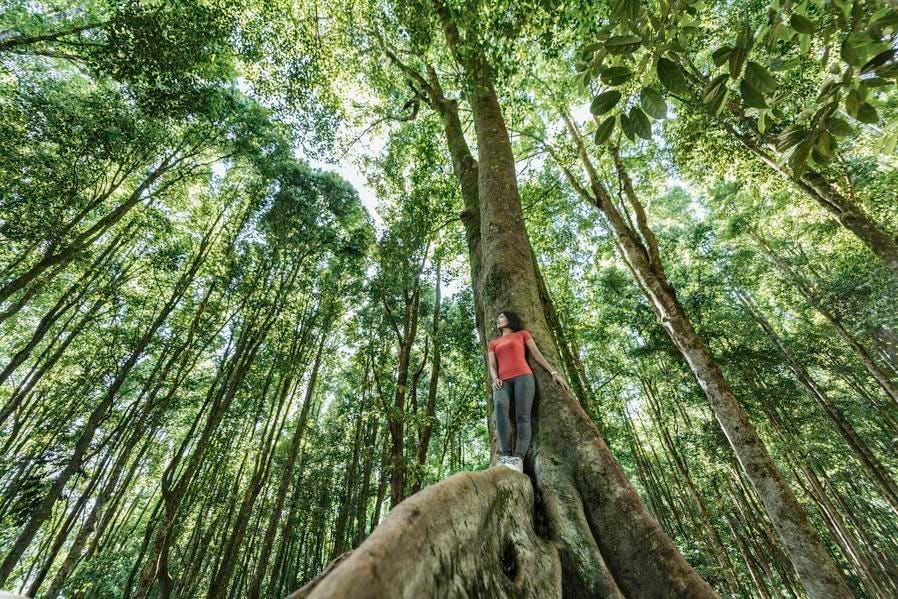Forbes Innovation Sustainability It’s Dawning On Humans That Human Health Connects To Everything Jeff McMahon Senior Contributor Opinions expressed by Forbes Contributors are their own. From Chicago, I write about climate change, green technology, energy. Following Jun 30, 2023, 12:00am EDT | Press play to listen to this article! Got it! Share to Facebook Share to Twitter Share to Linkedin In some places, a need for health care can exacerbate deforestation.
And deforestation can . . .
[+] exacerbate a need for health care. getty Humans tend to view their health-care system in isolation, which can make it harder to optimize human health as the climate changes, according to a panel of “One Health” experts convened by the National Academies of Sciences, Engineering, and Medicine. As the Centers for Disease Control puts it, “One Health is a collaborative, multisectoral, and transdisciplinary approach—working at the local, regional, national, and global levels—with the goal of achieving optimal health outcomes recognizing the interconnection between people, animals, plants, and their shared environment.
” Even within this movement, people tend to focus on people. Dr. Meghana Gadgil is concerned about both the impact of the health system on the climate—because, she said, the U.
S. health system produces enough pollution to cause 400,000 deaths, “similar to the burden from preventable medical errors”—and she’s concerned about the impact of climate change on human health. “Climate-sensitive diseases are some of the best illustrations of the intertwined relationships between environment, human health and health systems that we see,” she said in a June 13 webinar hosted by the National Academies’ New Voices program.
“For now, for instance, there’s a sharp rise in malaria, dengue, and many food-borne and water-borne diseases due to the expanding geographic range of both pathogens and vectors. We have changes in seasonality, rising temperature and precipitation, deforestation and air pollution, all of which contribute to endemic infectious diseases. And novel disease outbreaks will likely worsen as well.
” MORE FOR YOU Supreme Court Gets Rid Of Affirmative Action In College Admissions Today’s ‘Quordle’ Answers And Clues For Thursday, June 29 2023 Layoff Tracker Pokemon GO Maker Niantic Cuts 230 Jobs For patients to get treatment for these disorders, they obviously need a functioning transportation system, a system also vulnerable to climate impacts. For hospitals to provide care, they need power, another system vulnerable to climate impacts. During one outbreak of California wildfires, Gadgil said, 250 hospitals suffered power outages.
Many other sectors that integrate with health care are climate vulnerable. “So I want to invite everyone here to think differently about what constitutes a health system,” said Gadgil, who serves as an Assistant Professor at the University of California San Francisco in the Division of Hospital Medicine at San Francisco General Hospital and an Adjunct Assistant Professor at the UC Berkeley School of Public Health in the Division of Health Policy and Management. “So when we think about climate vulnerability, we should also be thinking about health systems as food systems, housing, transportation, building codes, access to utilities, indoor air-quality standards, internet and phone access.
” Some health organizations are already thinking this way, she added. For example, the Centers for Medicare and Medicaid have an “Accountable Health Communities Model,” which views health in relation to social needs like housing, food insecurity and access to utilities. Professor Hassam Mahmoud of Colorado State University studies the resilience of communities as systems of systems.
His team models the impacts of events on multiple systems at once: health care, education, transportation, power, etc. “So these models, in my personal opinion, are key to understanding how the entire system behaves, and how you can actually recover from extreme events and provide the best service to the public. ” But it was Dr.
Kinari Webb, founder of the non-profit organization Health in Harmony , who took the conversation beyond the human realm. About 30 years ago, Webb had traveled to Borneo to study orangutans in the rainforest. “In that time it was like basically a one-year silent retreat, and in that time of getting to know the oneness of all, it was very often interrupted by this terrible sound of chainsaws cutting down 22-story-tall trees,” she said.
“I was horrified, but I got slowly to know many of these loggers. And I was even more horrified, because what I discovered was that they loved the forest, and they wanted the forest to be there for their future, and they understood how important it was. But they were often logging to pay for health care.
” Many of the communities lacked local access to health care. People needed money to travel for essential services. For example, some women were desperate to get birth control, Webb said, because of high maternal mortality rates.
Facing such outcomes, they chose logging, even though they knew, she said, that deforestation could increase disease, reduce access to forest medicines and reduce the water supply for them and their fields. “In one region where we work, 90% of households admitted logging to pay for health care, even when they didn’t want to,” Webb said. So listening to what the people need can help to save the forest.
“The most efficient, the most effective and the fastest way to combat climate change is to address forest loss, and the experts in how to do that are the rainforest communities. ” MORE FROM FORBES Five Delusions That Are Dooming Homo Sapiens By Jeff McMahon Follow me on Twitter . Check out my website .
Jeff McMahon Editorial Standards Print Reprints & Permissions.
From: forbes
URL: https://www.forbes.com/sites/jeffmcmahon/2023/06/30/its-dawning-on-humans-that-human-health-connects-to-everything/



